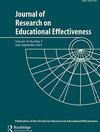校长专业发展能改善学业成果吗?来自宾夕法尼亚州的激励型领导诱导项目的证据
IF 1.6
4区 教育学
Q2 EDUCATION & EDUCATIONAL RESEARCH
Journal of Research on Educational Effectiveness
Pub Date : 2022-04-26
DOI:10.1080/19345747.2022.2052386
引用次数: 3
摘要
校长塑造了学校的学术环境。然而,关于主要专业发展是否能改善学校教育效果的证据有限。从2008-2009年开始,宾夕法尼亚州的激励领导力(PIL)入职计划要求新聘用的校长在任职5年内完成与新制定的州领导标准相关的有针对性的在职专业发展。使用宾夕法尼亚州所有学生、教师和校长的面板数据,我们利用各主要学校单元PIL入职时间的差异,并采用差异和事件研究策略来估计PIL入役对教师和学生结果的影响。我们发现,PIL入职培训通过提高教师的有效性来提高学生的数学成绩,PIL对教师有效性的影响集中在宾夕法尼亚州经济最弱势的城市学校。当校长在校长任期的前两年完成PIL入职培训时,校长的专业发展对教师效能的影响最大。我们还发现,有证据表明,在PIL入职后的几年里,教师流动率有所下降。我们讨论了我们的研究结果对主要归纳工作的影响。本文章由计算机程序翻译,如有差异,请以英文原文为准。
Does Principal Professional Development Improve Schooling Outcomes? Evidence from Pennsylvania’s Inspired Leadership Induction Program
Abstract Principals shape the academic setting of schools. Yet, there is limited evidence on whether principal professional development improves schooling outcomes. Beginning in 2008–2009, Pennsylvania’s Inspired Leadership (PIL) induction program required that newly hired principals complete targeted in-service professional development tied to newly established state leadership standards within 5 years of employment. Using panel data on all Pennsylvania students, teachers, and principals, we leverage variation in the timing of PIL induction across principal-school cells and employ difference-in-differences and event study strategies to estimate the impact of PIL induction on teacher and student outcomes. We find that PIL induction increased student math achievement through improvements in teacher effectiveness, and that the effects of PIL induction on teacher effectiveness were concentrated among the most economically disadvantaged and urban schools in Pennsylvania. Principal professional development had the greatest impact on teacher effectiveness when principals completed PIL induction during their first 2 years in the principalship. We also find evidence that teacher turnover declined in the years following the completion of PIL induction. We discuss the implications of our findings for principal induction efforts.
求助全文
通过发布文献求助,成功后即可免费获取论文全文。
去求助
来源期刊

Journal of Research on Educational Effectiveness
EDUCATION & EDUCATIONAL RESEARCH-
CiteScore
4.00
自引率
11.10%
发文量
37
期刊介绍:
As the flagship publication for the Society for Research on Educational Effectiveness, the Journal of Research on Educational Effectiveness (JREE) publishes original articles from the multidisciplinary community of researchers who are committed to applying principles of scientific inquiry to the study of educational problems. Articles published in JREE should advance our knowledge of factors important for educational success and/or improve our ability to conduct further disciplined studies of pressing educational problems. JREE welcomes manuscripts that fit into one of the following categories: (1) intervention, evaluation, and policy studies; (2) theory, contexts, and mechanisms; and (3) methodological studies. The first category includes studies that focus on process and implementation and seek to demonstrate causal claims in educational research. The second category includes meta-analyses and syntheses, descriptive studies that illuminate educational conditions and contexts, and studies that rigorously investigate education processes and mechanism. The third category includes studies that advance our understanding of theoretical and technical features of measurement and research design and describe advances in data analysis and data modeling. To establish a stronger connection between scientific evidence and educational practice, studies submitted to JREE should focus on pressing problems found in classrooms and schools. Studies that help advance our understanding and demonstrate effectiveness related to challenges in reading, mathematics education, and science education are especially welcome as are studies related to cognitive functions, social processes, organizational factors, and cultural features that mediate and/or moderate critical educational outcomes. On occasion, invited responses to JREE articles and rejoinders to those responses will be included in an issue.
 求助内容:
求助内容: 应助结果提醒方式:
应助结果提醒方式:


